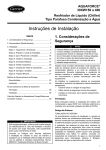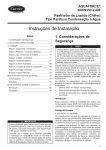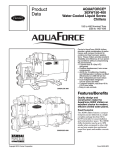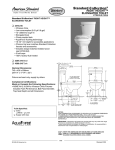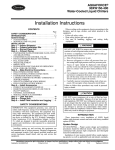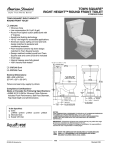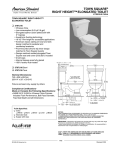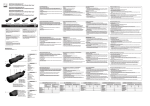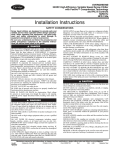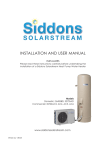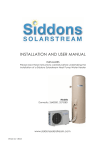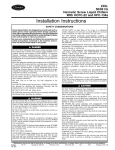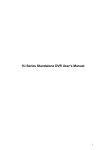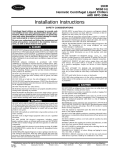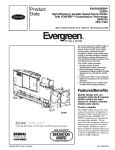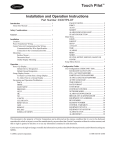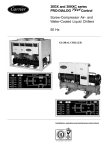Download Carrier 30XW325-400 User's Manual
Transcript
AQUAFORCE® 30XW325-400 Water-Cooled Liquid Screw Chillers Product Data 325 to 400 Nominal Tons (1133 to 1354 kW) ® a30-4659.eps Carrier's AquaForce 30XW chillers provide a great combination of performance and compact footprint for cooling and heat recovery applications. These chillers provide excellent reliability and efficiency at true operating conditions without compromising the environment. • Chlorine-free R-134a HFC refrigerant • Positive displacement, twin screw compressors • AHRI (Air Conditioning, Heating, and Refrigeration Institute) certified efficiencies to 0.468 kW per ton IPLV (integrated part load value) • Dual independent refrigerant circuits • Compact footprint, less than 48 in. (1219 mm) wide • Easy to use controls Features/Benefits Quality design and construction make the AquaForce 30XW chillers an excellent choice for modern, efficient chilled water plants. Small footprint The 30XW chillers feature a compact footprint and are delivered as a single complete package less than 48 in. (1219 mm) wide for easy installation and minimal indoor space. The 30XW chiller footprints may be up to 30% smaller when compared to other chillers and may require less mechanical room floor space and smaller concrete pads. Copyright 2009 Carrier Corporation Form 30XW-2PD Features/Benefits (cont) Easy installation The AquaForce® 30XW screw chillers are shipped with starter and unit mounted flow switch installed and can be shipped with a full R-134a refrigerant charge to minimize installation time. The unit provides single point power connection (using optional control power transformer) and quick, easy piping connections (using Victaulictype clamp on couplings). The 30XW 200-v, 230-v, 460-v, and 575-v units are designed in accordance with UL (Underwriters Laboratory) and UL Canada (Underwriters Laboratory, Canada) standards to minimize electrical inspection time. Dual circuits Dual independent refrigerant circuits provide reliable, dependable cooling, excellent part load operation, and redundancy. Each circuit includes its own compressor, electronic expansion valve, filter drier, and sight glass to assure operation. High efficiency The Aquaforce 30XW screw chiller efficiency levels meet or exceed energy efficiency requirements of ASHRAE (American Society of Heating, Ventilation and Air Conditioning Engineers) 90.1 2007 and CSA (Canadian Standards Association) for both full load and part load operation and is certified to AHRI standards. Per AHRI 550/590, chillers operate at design conditions less than one percent of the time. As a result, superior part load efficiency is required for today's chilled water applications. The 30XW chillers deliver integrated part-load Table of contents values (IPLV) as low as 0.468 kW per ton at AHRI conditions while offering the ability to operate in a broad range of applications and climates. This exceptional performance has a significant impact on energy savings and cost of ownership. Heat recovery The Aquaforce 30XW screw chiller provides up to 140 F (60 C) leaving condenser water (requires 300 psig [2068 kPa] condenser option) when applied in heat recovery applications. Further, the 30XW unit heat control mode can be utilized to maintain a constant leaving condenser water temperature. Low source controls provide evaporator suction protection to prevent nuisance trips when operating in heat recovery applications. This flexible capability allows a chiller to meet both cooling and heating requirements providing a high level of interchangeability within a chilled water plant. Environmental leadership Carrier has long been committed to the environment and its sustainability. The Aquaforce 30XW screw chiller provides customers with a high-efficiency, chlorine free, long-term solution unaffected by refrigerant phase outs. Carrier's decision to utilize non-ozone depleting R-134a refrigerant provides customers with a safe and environmentally sound choice without compromising efficiency. In addition, R-134a refrigerant was given an A1 safety rating by ASHRAE, meaning that it is among the safest refrigerants available. Page Features/Benefits . . . . . . . . . . . . . . . . . . . . . . . . . . . . . . . . . . . . . . . . . 1-4 Model Number Nomenclature . . . . . . . . . . . . . . . . . . . . . . . . . . . . . . . . . . 5 Capacity Ratings . . . . . . . . . . . . . . . . . . . . . . . . . . . . . . . . . . . . . . . . . . . 6 Physical Data . . . . . . . . . . . . . . . . . . . . . . . . . . . . . . . . . . . . . . . . . . . . 7,8 Options and Accessories . . . . . . . . . . . . . . . . . . . . . . . . . . . . . . . . . . . 9-11 Dimensions. . . . . . . . . . . . . . . . . . . . . . . . . . . . . . . . . . . . . . . . . . . . 12-14 Selection Procedure . . . . . . . . . . . . . . . . . . . . . . . . . . . . . . . . . . . . . . . . 15 Performance Data . . . . . . . . . . . . . . . . . . . . . . . . . . . . . . . . . . . . . . . 15-18 Controls . . . . . . . . . . . . . . . . . . . . . . . . . . . . . . . . . . . . . . . . . . . . . . 19,20 Typical Control Wiring Schematics . . . . . . . . . . . . . . . . . . . . . . . . . . . . . 21 Application Data . . . . . . . . . . . . . . . . . . . . . . . . . . . . . . . . . . . . . . . . 22-24 Typical Piping and Wiring . . . . . . . . . . . . . . . . . . . . . . . . . . . . . . . . . . . 25 Electrical Data . . . . . . . . . . . . . . . . . . . . . . . . . . . . . . . . . . . . . . . . . . 26-28 Guide Specifications . . . . . . . . . . . . . . . . . . . . . . . . . . . . . . . . . . . . . 29-32 2 Positive displacement screw compression Positive displacement compression ensures stable operation under all load conditions without the possibility of compressor surge. High-efficiency rotary twin screw compressors with infinitely variable slide valves allow the chillers to exactly match actual load conditions, delivering excellent part load performance. Factory testing A quick start-up is assured once installation is complete, since each 30XW unit is manufactured at an ISO (International Organization for Standardization) 9001:2000 listed manufacturing facility to ensure quality. In addition, all 30XW units that are shipped with a full charge of R-134a refrigerant are tested under load at the factory to provide reliable start-up. Low starting current (inrush) Dual circuit units stage the start up of the compressors thereby reducing the over all current draw by up to 40%. Constant or variable evaporator flow Aquaforce 30XW screw chillers are suitable for constant or variable evaporator flow. Hermetic motor The Aquaforce 30XW chiller utilizes motors that are hermetically sealed from the machine room. Refrigerant is used to cool the motor windings. Carrier's hermetic design eliminates: • Compressor shaft seals that require maintenance and increase the likelihood of refrigerant leaks. • Machine room cooling requirements associated with air-cooled motors, which dissipate heat to the mechanical room. • High noise levels common with aircooled motors, which radiate noise to the machine room and adjacent areas. • Shaft alignment problems that occur with open-drive designs during startup and operation, when equipment temperature variations cause thermal expansion. Positive pressure design Positive pressure designs eliminate the need for costly low pressure containment devices, reducing the initial cost of the system. The AquaForce® 30XW chiller's positive pressure design ensures that air, moisture and other performance degrading contaminants are not sucked inside the chiller. Purge units and their associated maintenance are no longer necessary. Refrigerant isolation valves The refrigerant isolation valves enable service personnel to store the refrigerant charge in the evaporator or condenser during servicing. These valves also allow the refrigerant to be stored inside the chiller during shipment from the factory minimizing start-up time. During servicing, the in-chiller storage reduces refrigerant loss and eliminates time-consuming transfer procedures. As a self-contained unit, the AquaForce 30XW chiller does not require additional remote storage systems. Optional suction service valves The optional suction service valves allow for further isolation of the compressor from the evaporator vessel. Marine container shipment The compact design allows for container shipment to export destinations, ensuring quality while reducing shipping cost. Heat exchangers The Aquaforce 30XW chillers utilize mechanically cleanable shell and tube evaporators and condensers available with a complete line of waterbox options to meet project specific requirements. One, two, and three pass arrangements are available to meet a wide variety of flow conditions. Nozzle in head and marine waterboxes are available to meet 150 psig (1034 kPa) and 300 psig (2068 kPa) piping requirements. Heat exchanger features include: ASME certified construction An independent agency certifies the design, manufacture, and testing of all heat exchangers to American Society of Mechanical Engineers (ASME) standards, ensuring heat exchanger safety, reliability and long life. The ASME U-stamp is applied to the refrigerant side of the evaporator and condenser and is applied to the water side of these heat exchangers when 300 psig (2068 kPa) marine waterboxes are provided. Electronic thermal-dispersion flow switch An electronic thermal-dispersion flow switch switch is included with the evaporator. The switch is factory installed and tested and contains no moving parts for high reliability. High performance tubing Carrier's AquaForce chillers utilize advances in heat transfer technology providing compact, high-efficiency heat exchangers. Tubing with advanced internally and externally enhanced geometry improves chiller performance by reducing overall resistance to heat transfer while reducing fouling. Evaporator tube expansion Evaporator tube expansion at center support sheets prevents unwanted tube movement and vibration, thereby reducing the possibility of premature tube failure. Tube wall thickness is greater at the expansion location, support sheets, and end tube sheets, to provide maximum strength and long tube life. Closely spaced intermediate support sheets Support sheets prevent tube sagging and vibration, thereby increasing heat exchanger life. Refrigerant filter isolation valves These valves allow filter replacement without pumping down the chiller, reducing service time and expense. Microprocessor controls The AquaForce 30XW screw chiller controls communicate in easy to understand English, making it as easy as possible to monitor and control each chiller while maintaining fluid temperatures. Controls are available with French, Portuguese and Spanish as standard configuration options. These controls result in higher chiller reliability, simplified training and correspondingly lower operational and maintenance costs. Two user interface options are available, the Touch Pilot™ display and the Navigator™ module. The Touch Pilot display is an easy to use touch screen display that provides simple navigation for configuration and control of the 30XW units. Carrier's exclusive handheld Navigator display provides convenience and powerful information in the palm of your hand. The Navigator display helps technicians to quickly diagnose problems and even prevent them from occurring. All 30XW units are ready to be used with Carrier Comfort Network® (CCN) devices. Controls features include: Automatic capacity override This function unloads the compressor whenever key safety limits are approached, increasing unit life. Chilled liquid reset Reset can be accomplished manually or automatically from the building management system. For a given capacity, reset allows operation at slower compressor speeds, saving energy when warmer chilled liquid can be used. Demand limiting This feature limits the power draw of the chiller during peak loading conditions. When incorporated into the CCN building automation system, a red line command holds chillers at their present capacity and prevents any other chillers from starting. If a load shed signal is received, the compressors are unloaded to avoid demand charges whenever possible. Ramp loading Ramp loading ensures smooth pulldown of liquid loop temperature and prevents a rapid increase in compressor power consumption during the pulldown period. Automated controls test The test can be executed prior to startup to verify that the entire control system is functioning properly. 365-day real time clock This feature allows the operator to program a yearly schedule for each week, weekends, and holidays. Occupancy schedules Schedules can be programmed into the controller to ensure that the chiller operates when cooling is required and remains off when not needed by the tenants or process. 3 Features/Benefits (cont) Extensive service menu Unauthorized access to the service menu can be password-protected. Built-in diagnostic capabilities assist in troubleshooting and recommend proper corrective action for pre-set alarms, resulting in greater up time. Alarm file This file maintains the last 50 time and date-stamped alarm and alert messages in memory. This function reduces troubleshooting time and cost. Configuration data backup Non-volatile memory provides protection during power failures and eliminates time consuming control reconfiguration. a30-4456 30-562 TOUCH PILOT™ DISPLAY SMOOTH ROTARY COMPRESSOR TWIN-SCREW DESIGN Com for tL ink MOD E Alarm Run Status ice Te st Status Serv Tem pera Pres Setp Inpu Outp sure tures s oints ts uts Conf igura tion Time Cloc k Oper ating Mod es s ESC Alarm ENT ER a30-3924 OPTIONAL NAVIGATOR™ DISPLAY 4 Model number nomenclature 30XW – 325 6 – 30XW – AquaForce® Water-Cooled Screw Chiller Unit Size (Nominal Tons) (kW) 325 – 325 (1133) 350 – 350 (1206) 400 – 400 (1354) Voltage 1 – 575-3-60 2 – 380-3-60 4 – 230-3-60 6 – 460-3-60 7 – 200-3-60 Condenser Options - – 2 Pass, NIH, 150 psig (1034 kPa), Victaulic, Discharge Connections (Std) 0 – 2 Pass, NIH, 150 psig (1034 kPa), Victaulic, Suction Connections 1 – 2 Pass, NIH, 150 psig (1034 kPa), Flange, Discharge Connections 2 – 2 Pass, NIH, 150 psig (1034 kPa), Flange, Suction Connections 3 – 2 Pass, NIH, 300 psig (2068 kPa), Victaulic, Discharge Connections 4 – 2 Pass, NIH, 300 psig (2068 kPa), Victaulic, Suction Connections 5 – 2 Pass, NIH, 300 psig (2068 kPa), Flange, Discharge Connections 6 – 2 Pass, NIH, 300 psig (2068 kPa), Flange, Suction Connections 7 – 2 Pass, MWB, 150 psig (1034 kPa), Victaulic, Discharge Connections 8 – 2 Pass, MWB, 150 psig (1034 kPa), Victaulic, Suction Connections 9 – 2 Pass, MWB, 300 psig (2068 kPa), Victaulic, Discharge Connections B – 2 Pass, MWB, 300 psig (2068 kPa), Victaulic, Suction Connections C – 2 Pass, MWB, 150 psig (1034 kPa), Flange, Discharge Connections D – 2 Pass, MWB, 150 psig (1034 kPa), Flange, Suction Connections F – 2 Pass, MWB, 300 psig (2068 kPa), Flange, Discharge Connections G – 2 Pass, MWB, 300 psig (2068 kPa), Flange, Suction Connections H – 1 Pass, NIH, 150 psig (1034 kPa), Flange, Discharge Leaving J – 1 Pass, NIH, 300 psig (2068 kPa), Flange, Discharge Leaving K – 1 Pass, MWB, 150 psig (1034 kPa), Flange, Discharge Leaving L – 1 Pass, MWB, 300 psig (2068 kPa), Flange, Discharge Leaving Heat Machine - – Std Condenser/Comfort Cooling (Std) M – Heat Machine Condenser/Comfort Cooling Evaporator Options - – 2 Pass, NIH, 150 psig (1034 kPa), Victaulic, Discharge Connections (Std) 0 – 2 Pass, NIH, 150 psig (1034 kPa), Victaulic, Suction Connections 1 – 2 Pass, NIH, 150 psig (1034 kPa), Flange, Discharge Connections 2 – 2 Pass, NIH, 150 psig (1034 kPa), Flange, Suction Connections 3 – 2 Pass, NIH, 300 psig (2068 kPa), Victaulic, Discharge Connections 4 – 2 Pass, NIH, 300 psig (2068 kPa), Victaulic, Suction Connections 5 – 2 Pass, NIH, 300 psig (2068 kPa), Flange, Discharge Connections 6 – 2 Pass, NIH, 300 psig (2068 kPa), Flange, Suction Connections 7 – 2 Pass, MWB, 150 psig (1034 kPa), Victaulic, Discharge Connections 8 – 2 Pass, MWB, 150 psig (1034 kPa), Victaulic, Suction Connections 9 – 2 Pass, MWB, 300 psig (2068 kPa), Victaulic, Discharge Connections B – 2 Pass, MWB, 300 psig (2068 kPa), Victaulic, Suction Connections C – 2 Pass, MWB, 150 psig (1034 kPa), Flange, Discharge Connections D – 2 Pass, MWB, 150 psig (1034 kPa), Flange, Suction Connections F – 2 Pass, MWB, 300 psig (2068 kPa), Flange, Discharge Connections G – 2 Pass, MWB, 300 psig (2068 kPa), Flange, Suction Connections H – 1 Pass, NIH, 150 psig (1034 kPa), Flange, Discharge Leaving J – 1 Pass, NIH, 300 psig (2068 kPa), Flange, Discharge Leaving K – 1 Pass, MWB, 150 psig (1034 kPa), Flange, Discharge Leaving L – 1 Pass, MWB, 300 psig (2068 kPa), Flange, Discharge Leaving M – 3 Pass, NIH, 150 psig (1034 kPa), Flange, Discharge Leaving N – 3 Pass, NIH, 150 psig (1034 kPa), Flange, Suction Leaving P – 3 Pass, NIH, 300 psig (2068 kPa), Flange, Discharge Leaving Q – 3 Pass, NIH, 300 psig (2068 kPa), Flange, Suction Leaving R – 3 Pass, MWB, 150 psig (1034 kPa), Flange, Discharge Leaving S – 3 Pass, MWB, 150 psig (1034 kPa), Flange, Suction Leaving T – 3 Pass, MWB, 300 psig (2068 kPa), Flange, Discharge Leaving V – 3 Pass, MWB, 300 psig (2068 kPa), Flange, Suction Leaving — — — — LEGEND Control Power Transformer Energy Management Module Ground Fault Circuit Interrupter Local Operating Network *Evaporator insulation is standard. – 4 – 3 B Packaging/Charging Options B – R-134a Refrigerant with Bag (Std) C – R-134a Refrigerant with Crate Over Bag D – Nitrogen Refrigerant with Bag F – Nitrogen Refrigerant with Crate Over Bag Design Series CPT EMM GFCI LON – MWB — Marine Waterbox NIH — Nozzle-In-Head XL — Across-the-Line Start Controls/Communications Options - – Navigator™ Display 0 – Navigator Display, EMM 1 – Navigator Display, GFCI Service Option 2 – Navigator Display, EMM, GFCI Service Option 3 – Touch Pilot™ Display (Std) 4 – Touch Pilot, EMM 5 – Touch Pilot, GFCI Service Option 6 – Touch Pilot, EMM, GFCI Service Option 7 – Navigator Display, BACnet™ Translator 8 – Navigator Display, EMM, BACnet Translator 9 – Navigator Display, GFCI Service Option, BACnet Translator B – Navigator Display, EMM, GFCI Service Option, BACnet Translator C – Touch Pilot Display (Std), BACnet Translator D – Touch Pilot Display, EMM, BACnet Translator F – Touch Pilot Display, GFCI Service Option, BACnet Translator G – Touch Pilot Display, EMM, GFCI Service Option, BACnet Translator H – Navigator Display, LON Translator J – Navigator Display, EMM, LON Translator K – Navigator Display, GFCI Service Option, LON Translator L – Navigator Display, EMM, GFCI Service Option, LON Translator M – Touch Pilot Display (Std), LON Translator N – Touch Pilot Display, EMM, LON Translator P – Touch Pilot Display, GFCI Service Option, LON Translator Q – Touch Pilot Display, EMM, GFCI Service Option, LON Translator Electrical Options - – Single Point, XL Starter, Terminal Block (Std 380, 460, 575-v) 0 – Single Point, Wye-Delta Starter, Terminal Block (Std 200,230-v) 3 – Dual Point, XL Starter, Terminal Block 4 – Dual Point, Wye-Delta Starter, Terminal Block 7 – Single Point, XL Starter, Non-Fused Disconnect 8 – Single Point, Wye-Delta, Non-Fused Disconnect C – Dual Point, XL Starter, Non-Fused Disconnect D – Dual Point, Wye-Delta Starter, Non-Fused Disconnect H – Single Point, XL Starter, Terminal Block, CPT J – Single Point, Wye-Delta Starter, Terminal Block, CPT M – Dual Point, XL Starter, Terminal Block, CPT N – Dual Point, Wye-Delta Starter, Terminal Block, CPT R – Single Point, XL Starter, Non-Fused Disconnect, CPT S – Single Point, Wye-Delta, Non-Fused Disconnect, CPT W – Dual Point, XL Starter, Non-Fused Disconnect, CPT X – Dual Point, Wye-Delta Starter, Non-Fused Disconnect, CPT Refrigeration Circuit Options* 4 – Standard Unit 6 – With Suction Service Valves D – With Minimum Load Control G – With Suction Service Valves and Minimum Load Control N – With Condenser Insulation for Heat Machine Q – With Suction Service Valves and Condenser Insulation for Heat Machine X – With Minimum Load Control and Condenser Insulation for Heat Machine Z – With Suction Service Valves, Minimum Load Control and Condenser Insulation for Heat Machine a30-4744 Quality Assurance Certified to ISO 9001:2000 5 Capacity ratings 30XW UNIT SIZE 325 350 400 CAPACITY Tons 322 343 385 Output (kW) 1132.5 1206.3 1354.0 INPUT POWER (kW) 204.8 215.7 242.8 EVAPORATOR FLOW gpm L/s 773 824 924 48.8 52.0 58.3 EVAPORATOR PRESSURE DROP Ft of kPa Water 15.6 46.5 17.5 52.2 21.5 64.1 LEGEND AHRI — Air Conditioning, Heating and Refrigeration Institute IPLV — Integrated Part Load Value NOTES: 1. Certified in accordance with AHRI Standard 550/590 at standard rating conditions. 2. Standard rating conditions are as follows: Evaporator Conditions: Leaving Water Temperature: 44 F (6.7 C) Flow: 2.4 gpm per ton (0.043 L/s per kW) Condenser Conditions: Entering Water Temperature:85 F (29.4 C) Flow: 3.0 gpm per ton (0.054 L/s per kW) 6 CONDENSER FLOW gpm L/s 967 1029 1155 61.0 64.9 72.9 CONDENSER PRESSURE DROP FULL LOAD IPLV EFFICIENCY Ft of (kW/Ton) (kW/Ton) kPa Water 10.9 32.5 0.636 0.468 12.3 36.7 0.629 0.471 15.2 45.3 0.631 0.474 Fouling Factor (Evaporator): 0.00010 hr x sq ft x F per Btuh (0.000018 m2 x K per W) Fouling Factor (Condenser): 0.00025 hr x sq ft x F per Btuh (0.000044 m2 x K per W) 3. IPLV is a single number part-load efficiency value calculated from the system full-load efficiency values and corrected for a typical building air-conditioning application. 4. Contact Carrier for custom ratings. 5. Data shown for standard chiller with 2 pass, nozzle-in-head (NIH) waterboxes. Physical data 30XW325-400 UNIT PHYSICAL DATA — ENGLISH 30XW UNIT SIZE NOMINAL CAPACITY (tons) UNIT WEIGHT (lb) (Operating/Shipping) COMPRESSORS Compressor Speed (rpm) Compressor Model Number (qty) Unloading Type Minimum Step Capacity % (standard) Optional % Economizer Temperature Relief Valve Connection (in. SAE Flare) (each circuit) REFRIGERANT Charge (lb) Circuit A Charge (lb) Circuit B OIL Charge (gal.) Circuit A Charge (gal.) Circuit B EVAPORATOR Net Fluid Volume (gal.) Maximum Refrigerant Pressure (psig) Maximum Water Side Pressure (psig) Standard Optional Water Connections Inlet and Outlet (in.) 1-Pass NIH or MWB Flange (optional) 1-Pass NIH Victaulic (optional) 2-Pass NIH or MWB Flange (optional) 2-Pass NIH Victaulic (standard) 2-Pass MWB Victaulic (optional) 3-Pass NIH or MWB Flange (optional) 3-Pass NIH Victaulic (optional) Drain (in. NPT) Relief Valve Connection (in. NPTF) Quantity Per Circuit Relief Valve Setting (psig) Flow Rate (lb air/min) CONDENSER Net Fluid Volume (gal.) Maximum Refrigerant Pressure (psig) Standard Condenser Heat Machine Maximum Water Side Pressure (psig) Standard Optional Heat Machine Water Connections Inlet and Outlet (in.) 1-Pass NIH or MWB Flange (optional) 1-Pass NIH Victaulic (optional) 2-Pass NIH or MWB Flange (optional) 2-Pass NIH Victaulic (standard) 2-Pass MWB Victaulic (optional) Drain (in. NPT) Relief Valve Connection (in. NPTF) (Standard/Heat Machine) Quantity Per Circuit Relief Valve Setting (psig) Flow Rate (lb air/min) Temperature Relief Valve Connection (in. SAE Flare) Discharge Line (Qty per Circuit) Liquid Line (Qty per Circuit) CHASSIS DIMENSIONS (ft-in.) Length Width Height HFC — MWB — NIH — NPTF — POE — SAE — 325 325 14,319/13,163 No — 260 260 350 350 14,515/13,369 Semi-hermetic, twin screw 3500 06TU483 (2) Slide Valve 15% 10% Yes 3/8 HFC, R-134a 270 270 POE, SW-220 4 4 400 400 14,759/13,489 06TU554 (2) 76.0 220 150 300 6 8 6 8 6 6 8 3/ 8 3 /4 1 220 31.7 82.6 220 300 150 300 300 6 8 6 8 6 3/ 8 3 /4 / 3 /4 2/2 220/300 31.7/46.6 1/ 4 1 1 13 - 3 3/4 3 - 11 3/8 6 - 6 11/16 LEGEND Hydrofluorocarbon Marine Waterbox Nozzle-In-Head National Pipe Thread Female Polyolester Society of Automotive Engineers 7 Physical data (cont) 30XW325-400 UNIT PHYSICAL DATA — SI 30XW UNIT SIZE NOMINAL CAPACITY (kW) UNIT WEIGHT (kg) (Operating/Shipping) COMPRESSORS Compressor Speed (r/s) Compressor Model Number (qty) Unloading Type Minimum Step Capacity % (standard) Optional % Economizer Temperature Relief Valve Connection (in. SAE Flare) (each circuit) REFRIGERANT Charge (kg) Circuit A Charge (kg) Circuit B OIL Charge (L) Circuit A Charge (L) Circuit B EVAPORATOR Net Fluid Volume (L) Maximum Refrigerant Pressure (kPa) Maximum Water Side Pressure (kPa) Standard Optional Water Connections Inlet and Outlet (in.) 1-Pass NIH or MWB Flange (optional) 1-Pass NIH Victaulic (optional) 2-Pass NIH or MWB Flange (optional) 2-Pass NIH Victaulic (standard) 2-Pass MWB Victaulic (optional) 3-Pass NIH or MWB Flange (optional) 3-Pass NIH Victaulic (optional) Drain (in. NPT) Relief Valve Connection (in. NPTF) Quantity Per Circuit Relief Valve Setting (kpa) Flow Rate (kg air/min) CONDENSER Net Fluid Volume (L) Maximum Refrigerant Pressure (kPa) Standard Condenser Heat Machine Maximum Water Side Pressure (kPa) Standard Optional Heat Machine Water Connections Inlet and Outlet (in.) 1-Pass NIH or MWB Flange (optional) 1-Pass NIH Victaulic (optional) 2-Pass NIH or MWB Flange (optional) 2-Pass NIH Victaulic (standard) 2-Pass MWB Victaulic (optional) Drain (in. NPT) Relief Valve Connection (in. NPTF) (Standard/Heat Machine) Quantity Per Circuit Relief Valve Setting (kpa) Flow Rate (kg air/min) Temperature Relief Valve Connection (in. SAE Flare) Discharge Line (Qty per Circuit) Liquid Line (Qty per Circuit) CHASSIS DIMENSIONS (mm) Length Width Height HFC — MWB — NIH — NPTF — POE — SAE — 8 LEGEND Hydrofluorocarbon Marine Waterbox Nozzle-In-Head National Pipe Thread Female Polyolester Society of Automotive Engineers 325 1133 6495/5971 No — 117.9 117.9 350 1206 6584/6064 Semi-hermetic, twin screw 58.3 06TU483 (2) Slide Valve 15% 10% Yes 3 /8 HFC, R-134a 122.5 122.5 POE, SW-220 15.1 15.1 287.7 1517 1034 2068 6 8 6 8 6 6 8 3/ 8 3 /4 1 1517 14.38 312.7 1517 2068 1034 2068 2068 6 8 6 8 6 3/ 8 3 /4 / 3 /4 2/2 1517/2068 14.38/21.1 1/ 4 1 1 4057.7 1203.3 1998.7 400 1354 6695/6119 06TU554 (2) Options and accessories ITEM Controls Options Navigator Hand-Held Display Remote Enhanced Display BACnet Translator Control LON Translator Control Energy Management Module Evaporator Options One-Pass Evaporator Head Three-Pass Evaporator Head Marine Waterboxes Flanged Connections Suction Service Valve 300 psig (2068 kPa) Operating Pressure Condenser Options Heat Machine Condenser One-Pass Condenser Head Marine Waterboxes Flanged Connections 300 psig (2068 kPa) Operating Pressure Starter Options Wye-Delta Starter Dual Point Power Non-Fused Disconnect Control Transformer 115-v GFCI Convenience Outlet Unit Options Minimum Load Control Temperature Reset Sensor Nitrogen Charge Crate for Shipment Vibration Pads Vibration Isolation Springs FACTORYINSTALLED OPTION FIELDINSTALLED ACCESSORY X X X X X X X X X X X X X X X X X X X X The 300 psig (2068 kPa) evaporator operating pressure option allows operation for water-side pressure up to 300 psig (2068 kPa). The 300 psig (2068 kPa) condenser operating pressure option allows operation for water-side pressure up to 300 psig (2068 kPa). Minimum load control allows additional capacity reduction for unit operation below the minimum step of unloading via hot gas bypass. Marine waterboxes provide water piping connections extending from the side of the waterbox (as opposed to extending from the end of the waterbox). This option also includes a removable bolt on waterbox cover allowing access to the heat exchanger tubes without breaking the existing field piping. This option is available for both the evaporator and condenser. X X X X X X X X X a30-4684.eps X X Factory-installed options Navigator™ module provides a portable, hand-held display for convenient access to unit status, operation, configuration and troubleshooting diagnostics capability. The four-line, 20-character LCD (liquid crystal display) display provides clear language information in English, French, Spanish, or Portuguese. The Navigator module features an industrial grade extension chord and magnets located on the back of the weatherproof enclosure to allow attachment to sheet metal components for hands free operation. BACnet™ translator control provides an interface between the chiller and BACnet Local Area Network (LAN, i.e., MS/TP EIA 485). The BACnet translator control is also available as a field-installed option. LON translator control provides an interface between the chiller and Local Operating Network (LON, i.e., LONWorks FT-10A ANSI/EIA-709.1). The LON translator control is also available as a field-installed option. Energy management module provides energy management capabilities to minimize chiller energy consumption. Several features are provided with this module including leaving fluid temperature reset, cooling set point reset or demand limit control from a 4 to 20 mA signal, 2-point demand limit control (from 0 to 100%) activated by a remote contact closure, and discrete input for "Ice Done" indication for ice stage system interface. Flanged connection option provides an ANSI (American National Standards Institute) flange on the end of the chiller water piping for connection to a customer supplied mating flange in the field piping. This option is available for both the evaporator and condenser. a30-4685 One-pass evaporator provides a lower pressure drop through the evaporator for applications with low delta T (temperature) or high flow or where the evaporators are piped in a series or side stream arrangement. One-pass evaporator is only available with flanged connections and with discharge end leaving water connection. Three-pass evaporator provides a greater efficiency for brine applications and in applications with a high delta T and low flow. Three-pass evaporator is only available with flanged connections. Heat machine condenser allows operation with up to 140 F (60 C) leaving condenser water temperature (see E-CAT for selections). In addition, this option provides factory-installed thermal insulation on the condenser, condenser flow switch and leaving condenser water 9 Options and accessories (cont) temperature sensor to facilitate operating in HEAT mode. Heat machine units require 300 psig (2068 kPa) option and field-installed thermal insulation on the compressor discharge piping and waterbox heads because of high temperature. One-pass condenser provides a lower pressure drop through the condenser for applications with low delta T (temperature) or high flow or where the condensers are piped in a series. The one-pass condenser option is only available with flanged connections and with a discharge end leaving water connection. Wye-delta start is an alternate starting method which reduces the inrush current when starting the compressor. Wye delta start is standard on 208-v, and 230-v units, optional for 380-v, 460-v, and 575-v. Dual point power provides a means for connecting two sources of power to dual compressor 30XW chillers. One source of power is wired to operate the compressor on the A circuit and one source of power is wired to operate the compressor on the B circuit of the chiller. Non-fused disconnect provides a no load, lockable, through the door handle disconnect for unit power on the chiller. On dual point power, one disconnect is provided for each of the two main power supplies. This disconnect does not remove the control circuit from power supply. Control transformer is sized to supply the needs of the control circuit from the main power supply. 115-v GFCI convenience outlet includes 4 amp GFI (ground fault interrupt) receptacle. Convenience outlet is 115-v female receptacle. Not available with 380-v units. Nitrogen charge provides a 15 lb (6.8 kg) charge of nitrogen instead of a full factory charge of R-134a refrigerant to keep the chiller refrigerant circuit dry during shipment. This option is recommended for applications where the unit will be disassembled prior to installation. Units shipped with a nitrogen charge will receive an electrical continuity test at the factory prior to shipment. Crate for shipment provides a wooden crate around the chiller. The chiller is bagged prior to being placed in the crate. This option is recommended for export orders. Suction service valves allow for further isolation of the compressor from the evaporator vessel. Field-installed accessories Remote enhanced display is a remotely mounted indoor 40-character per line, 16-line display panel for unit monitoring and diagnostics. 10 BACnet™ translator control provides an interface between the chiller and BACnet Local Area Network (LAN, i.e., MS/TP EIA 485). The BACnet translator control is also available as a factory-installed option. LON translator control provides an interface between the chiller and Local Operating Network (LON, i.e., LONWorks FT-10A ANSI/EIA-709.1). The LON translator control is also available as a factory-installed option. Energy management module provides energy management capabilities to minimize chiller energy consumption. Several features are provided with this module including leaving fluid temperature reset, cooling set point reset or demand limit control from a 4 to 20 mA signal, 2-point demand limit control (from 0 to 100%) activated by a remote contact closure, and discrete input for "Ice Done" indication for ice stage system interface. Temperature reset sensor provides temperature reset capability from either the occupied space or outdoor temperature sensor. NOTE: Temperature reset capability using return temperature is standard. Vibration isolation pads are neoprene pads for installation under the chiller feet at the jobsite. Vibration springs provide a set of non-siesmic spring isolators for installation at the jobsite. Navigator™ module provides a portable, hand-held display for convenient access to unit status, operation, configuration and troubleshooting diagnostics capability. The four-line, 20-character LCD (liquid crystal display) display provides clear language information in English, French, Spanish, or Portuguese. The Navigator module features an industrial grade extension chord and magnets located on the back of the weatherproof enclosure to allow attachment to sheet metal components for hands free operation. Field-supplied and field-installed insulation Evaporator waterbox insulation must be field installed. When insulating waterboxes, allow for service access and removal of covers. To estimate waterbox cover areas, refer to the following figure. Insulation for discharge piping between the compressor and condenser must be field installed on heat machine units. Refer to the following figure. Condenser waterbox insulation must be field installed on heat machine units. When insulating waterboxes, allow for service access and removal of covers. To estimate waterbox cover areas, refer to the following figure. FIELD-SUPPLIED AND FIELD-INSTALLED INSULATION EVAPORATOR WATERBOX INSULATION NEEDED CONDENSER WATERBOX INSULATION NEEDED (HEAT MACHINE UNITS ONLY) DISCHARGE PIPING INSULATION NEEDED (HEAT MACHINE UNITS ONLY) EVAPORATOR WATERBOX INSULATION NEEDED NOTES: 1. Field-installed insulation for standard units shown in light gray. 2. Field-installed insulation for heat machine units shown in dark gray. 3. Back of the unit shown. EVAPORATOR WATERBOX INSULATION NEEDED CONDENSER WATERBOX INSULATION NEEDED (HEAT MACHINE UNITS ONLY) a30-4686 11 Dimensions 30XW UNIT DIMENSIONS a30-4745 SEE NIH EVAPORATOR DETAIL FOR NOZZLE MEASUREMENTS EVAPORATOR SUCTION END DISCHARGE END CONDENSER SEE NIH CONDENSER DETAIL FOR NOZZLE MEASUREMENTS MLV (OPTIONAL) MLV (OPTIONAL) STANDARD 30XW UNIT DIMENSIONS 30XW UNIT OPERATING SIZE WEIGHT, lb [kg] 325 350 400 14,319 [6495] 14,515 [6584] 14,759 [6695] MOUNTING LOCATION WEIGHT, lb [kg] DIMENSIONS (ft-in. [mm]) 1 2 3 4 A B C 3734 [1694] 3828 [1736] 3337 [1514] 3420 [1551] 6-3/8 [1837] 6-3/8 [1837] 3/8 [9.53] 3785 [1717] 3880 [1760] 3383 [1535] 3467 [1573] 6-3/8 [1837] 6-3/8 [1837] 3/8 [9.53] 3848 [1745] 3946 [1790] 3439 [1560] 3526 [1599] 6-3/8 [1837] 6-3/8 [1837] 3/8 [9.53] MLV MWB NIH SSV — — — — LEGEND Minimum Load Valve Marine Waterbox Nozzle-In-Head Suction Service Valve NOTES: 1. Weights shown for standard chiller (2 pass with NIH, victaulic waterboxes). 2. See page 14 for unit mounting locations. 30XW UNIT AND WATERBOX DIMENSIONS CONNECTIONS PASSES WATERBOX (EVAP/COND) NIH/NIH NIH/MWB Same Ends MWB/NIH MWB/MWB 2 Pass NIH/NIH NIH/MWB MWB/NIH Opposite Ends MWB/MWB 1 or 3 Pass NIH/NIH NIH/MWB MWB/NIH MWB/MWB NOZZLE TYPE Victaulic Flange Victaulic Flange Victaulic Flange Victaulic Flange Victaulic Flange Victaulic Flange Victaulic Flange Victaulic Flange Flange Flange Flange Flange D ft-in. [mm] 3 13-3 /4 [4057] 13-91/16 [4193] E ft-in. [mm] F ft-in. [mm] 3-113/8 [1210] 6-611/16 [1999] 3-113/8 [1210] 6-611/16 [1999] 13-115/8 [4258] 13-65/16 [4123] 14-47/16 [4380] 14-23/16 [4323] 14-615/16 [4443] 14-213/16 [4339] 14-83/16 [4475] 14-1011/16 [4539] 14-55/8 [4410] 14-1011/16 [4539] MAX UNIT OPERATING WEIGHT lb [kg] 325 350 400 14,319 [6495] 14,515 [6495] 14,759 [6695] 14,651 [6646] 14,847 [6646] 15,091 [6845] 14,498 [6576] 14,694 [6576] 14,938 [6776] 14,739 [6685] 14,935 [6685] 15,179 [6885] 14,489 [6572] 14,685 [6572] 14,929 [6772] 14,746 [6689] 14,768 [6689] 15,012 [6809] 14,668 [6653] 14,864 [6653] 15,108 [6853] 14,834 [6729] 15,030 [6729] 15,274 [6928] 14,319 [6495] 14,515 [6495] 14,759 [6695] 14,651 [6646] 14,847 [6646] 15,091 [6845] 14,498 [6576] 14,694 [6576] 14,938 [6776] 14,739 [6685] 14,935 [6685] 15,179 [6885] 14,489 [6572] 14,685 [6572] 14,929 [6772] 14,746 [6689] 14,768 [6689] 15,012 [6809] 14,668 [6653] 14,864 [6653] 15,108 [6853] 14,834 [6729] 15,030 [6729] 15,274 [6928] 14,828 [6726] 15,024 [6726] 15,268 [6925] 15,223 [6905] 14,768 [6896] 15,012 [6809] 15,244 [6915] 15,440 [6894] 15,684 [7114] 15,581 [7067] 15,777 [7063] 16,021 [7267] NOTES: 1. Operating weight includes weight of water, refrigerent, and oil. 2. Denotes center of gravity. 3. Dimensions shown in ft-in. [mm] unless noted. 4. The recommended service clearance around the machine is 3 ft [914.4 mm]. 5. Victaulic nozzles are standard on all units. A flow switch can be factory-installed in evaporator inlet victaulic nozzle. 6. Maximum fluid side pressure of condenser or evaporator is 150 psig [1034 kPa] (standard) or 300 psig [2068 kPa] (optional). 7. Operating weight includes weight of water, refrigerant, and oil. 12 DISCHARGE END INCOMING CONTROL POWER 1 x 7/8” KNOCKOUT a30-4748 DISCHARGE END a30-4747 D DOOR CLEARANCE SPACE SUCTION END 30XW UNIT DIMENSIONS (cont) SUCTION END 3 3/16” [81 mm] EVAP a30-4755 13 Dimensions (cont) 30XW UNIT DIMENSIONS (cont) WATERBOX FLANGE DETAIL MOUNTING LOCATIONS a30-4688 a30-4725 a30-4751 NIH EVAPORATOR DISCHARGE DISCHARGE DISCHARGE DISCHARGE DISCHARGE SUCTION SUCTION SUCTION SUCTION SUCTION UNIT NUMBER OF PASSES A in. (mm) B in. (mm) 2 61/16 (154) 1 3 30XW325-400 CONNECTION SIZE Flange Victaulic 61/16 (154) 6 8 0 (0) 0 (0) 6 8 61/16 (154) 61/16 (154) 6 8 UNIT CONNECTION SIZE NUMBER OF PASSES A in. (mm) B in. (mm) Flange Victaulic 2 63/4 (171) 63/4 (171) 6 8 1 0 (0) 0 (0) 6 8 30XW325-400 a30-4750 a30-4752 MARINE CONDENSER MARINE EVAPORATOR DISCHARGE DISCHARGE DISCHARGE DISCHARGE DISCHARGE SUCTION SUCTION SUCTION SUCTION SUCTION UNIT 30XW325-400 14 a30-4749 NIH CONDENSER NUMBER OF PASSES A in. (mm) B in. (mm) 2 71/2 (191) 1 3 CONNECTION SIZE Flange Victaulic 71/2 (191) 6 6 0 (0) 0 (0) 6 — 71/2 (191) 71/2 (191) 6 — UNIT 30XW325-400 NUMBER OF A PASSES in. (mm) 2 1 B in. (mm) 73/8 (187) 73/8 (187) 0 (0) 0 (0) CONNECTION SIZE Flange Victaulic 6 6 6 — Selection procedure Carrier’s packaged selection program provides quick, easy selection of Carrier’s water-cooled chillers. The program considers specific temperature, fluid and flow requirements among other factors such as fouling and altitude corrections. Before selecting a chiller, consider the following points: Leaving water (fluid) temperature (LWT) • The LWT must be at least 40 F (4.4 C) or greater. • If the LWT requirement is greater than 60 F (15.5 C), a mixing loop is required. Entering water (fluid) temperature (EWT) • If the EWT requirement is greater than 70 F (21.1 C), a mixing loop is required. The EWT should not exceed 70 F (21.1 C) for extended operation. Pulldown can be accomplished from 95 F (35 C). Evaporator flow rate or evaporator delta-T: • The evaporator delta-T (EWT – LWT) must fall between 5 and 20° F (2.8 and 11.1° C) while still meeting the maximum entering requirements. • For larger or smaller delta-T applications, a mixing loop is required. If the evaporator flow is variable, the rate of change of flow should not exceed 10% per minute. The loop volume in circulation must equal or exceed 3 gallons per nominal ton (3.2 L per kW) of cooling for temperature stability and accuracy in normal air conditioning applications. In process cooling applications, there should be 6 to 10 gallons per ton (6.5 to 10.8 L per kW). To achieve this loop volume, it is often necessary to install a tank in the loop. The tank should be baffled to ensure there is no stratification, and that water (or brine) entering the tank is adequately mixed with liquid in the tank. See Water Loop Volume in the Application Data section. Evaporator pressure drop: • A high evaporator pressure drop can be expected when the evaporator delta-T is low. A mixing loop can help to alleviate this situation. • The three-pass evaporator option is recommended to increase performance when the evaporator delta T is high. This is particularly helpful with brine applications. Condenser pressure drop: • A high condenser pressure drop can be expected when the condenser delta-T is low. A one-pass condenser can help lower pressure drop. Series chillers: • One-pass heat exchangers can help lower pressure drop when heat exchangers are placed in series. Water quality, fouling factor: • Poor water quality can increase the required evaporator fouling factor. • Higher than standard fouling factors lead to lower capacity and higher input kW from a given chiller size compared to running the same application with better water quality (and lower fouling factors). Temperature reset: • Return water (standard) • Outside air temperature (standard) • Space temperature (accessory sensor required) • 4 to 20 mA (requires an energy management module) Demand limit: • 2-step (requires an energy management module) • 4 to 20 mA (requires an energy management module) • CCN Loadshed Performance data EVAPORATOR AND CONDENSER FLOW RATES 30XW UNIT 325 350 400 Two pass One pass Three pass Two pass One pass Three pass Two pass One pass Three pass EVAPORATOR Leaving Fluid/Entering Fluid Minimum Maximum 40 F (4.4 C)/ 60 F (15.6 C)/ 45 F (7.2 C) 70 F (21.1 C) Minimum Maximum Flow Rate Flow Rate GPM L/s GPM L/s 411 25.9 1481 93.4 790 49.8 3126 197.2 247 15.6 987 62.3 433 27.3 1557 98.2 830 52.4 3287 207.4 260 16.4 1038 65.5 486 30.7 1751 110.4 934 58.9 3696 233.1 292 18.4 1167 73.6 CONDENSER Minimum Entering Maximum Leaving Fluid Fluid 65 F (18.3 C) 118 F (47.8 C)* Minimum Flow Rate GPM L/s 494 31.1 987 62.3 — — 519 32.7 1038 65.5 — — 584 36.8 1167 73.6 — — Maximum Flow Rate GPM L/s 1974 124.5 3290 207.6 — — 2076 131.0 3460 218.3 — — 2334 147.3 3890 245.4 — — NOMINAL Evaporator Condenser Nominal Flow Rate GPM L/s 790 49.8 790 49.8 790 49.8 830 52.4 830 52.4 830 52.4 934 58.9 934 58.9 934 58.9 Nominal Flow Rate GPM L/s 987 62.3 987 62.3 — — 1038 65.5 1038 65.5 — — 1167 73.6 1167 73.6 — — *Maximum condenser fluid temperature shown for standard condensing option. Heat machine option may have leaving fluid temperatures up to 140 F (60 C). 15 Performance data (cont) 30XW325-400 EVAPORATOR MARINE WATERBOX (kPa) ft wg (119.4) 40.00 Pressure Drop (104.4) 35.00 3 pass 1 pass 2 pass (89.5) 30.00 (74.6) 25.00 (59.7) 20.00 (44.8) 15.00 (29.8) 10.00 (14.9) 5.00 (0) 0.00 0 (0) 500 (31.5) 1000 1500 2000 (63.1) (94.6) (126.2) Evaporator Flow Rate 2500 (157.7) 3000 gpm (189.3) (L/s) NOTE: The table above represents pressure drops only. The table does not imply that the chiller can be properly applied over the entire range of evaporator water flow rates represented. A30-4691 30XW325-400 EVAPORATOR NIH FLANGE (kPa) ft wg (119.4) 40.00 Pressure Drop 1 pass 3 pass (104.4) 35.00 2 pass (89.5) 30.00 (74.6) 25.00 (59.7) 20.00 (44.8) 15.00 (29.8) 10.00 (14.9) 5.00 (0) 0.00 0 (0) LEGEND NIH — Nozzle-In-Head 500 (31.5) 1000 1500 (63.1) (94.6) Evaporator Flow Rate 2000 gpm (126.2) (L/s) NOTE: The table above represents pressure drops only. The table does not imply that the chiller can be properly applied over the entire range of evaporator water flow rates represented. A30-4692 16 30XW325-400 EVAPORATOR NIH VICTAULIC (kPa) ft wg (119.4) 40.00 3 pass Pressure Drop (104.4) 35.00 1 pass 2 pass (89.5) 30.00 (74.6) 25.00 (59.7) 20.00 (44.8) 15.00 (29.8) 10.00 (14.9) 5.00 (0) 0.00 0 (0) 500 (31.5) LEGEND NIH — Nozzle-In-Head 1000 1500 2000 (63.1) (94.6) (126.2) Evaporator Flow Rate 2500 (157.7) 3000 gpm (189.3) (L/s) A30-4693 NOTE: The table above represents pressure drops only. The table does not imply that the chiller can be properly applied over the entire range of evaporator water flow rates represented. (kPa) ft wg 30XW325-400 CONDENSER MARINE WATERBOX (119.4) 40.00 Pressure Drop (104.4) 35.00 1 pass 2 pass (89.5) 30.00 (74.6) 25.00 (59.7) 20.00 (44.8) 15.00 (29.8) 10.00 (14.9) 5.00 (0) 0.00 0 (0) 500 (31.5) 1000 (63.1) 1500 (94.6) 2000 (126.2) 2500 (157.7) 3000 (189.3) 3500 gpm (220.8) (L/s) Condenser Flow Rate NOTE: The table above represents pressure drops only. The table does not imply that the chiller can be properly applied over the entire range of condenser water flow rates represented. A30-4694 17 Performance data (cont) 30XW325-400 CONDENSER NIH FLANGE (kPa) ft wg (119.4) 40.00 Pressure Drop (104.4) 35.00 2 pass 1 pass (89.5) 30.00 (74.6) 25.00 (59.7) 20.00 (44.8) 15.00 (29.8) 10.00 (14.9) 5.00 (0) 0.00 0 (0) 500 (31.5) 1000 (63.1) 1500 (94.6) 2500 gpm (157.7) (L/s) 2000 (126.2) Condenser Flow Rate LEGEND NIH — Nozzle-In-Head A30-4695 NOTE: The table above represents pressure drops only. The table does not imply that the chiller can be properly applied over the entire range of evaporator water flow rates represented. (kPa) ft wg 30XW325-400 CONDENSER NIH VICTAULIC (119.4) 40.00 (104.4) 35.00 1 pass Pressure Drop 2 pass (89.5) 30.00 (74.6) 25.00 (59.7) 20.00 (44.8) 15.00 (29.8) 10.00 (14.9) 5.00 (0) 0.00 0 (0) LEGEND NIH — Nozzle-In-Head 500 (31.5) 1000 (63.1) 1500 (94.6) 2000 (126.2) 2500 (157.7) Condenser Flow Rate 3000 (189.3) 3500 gpm (220.8) (L/s) A30-4696 NOTE: The table above represents pressure drops only. The table does not imply that the chiller can be properly applied over the entire range of evaporator water flow rates represented. 18 Controls Microprocessor The chiller microprocessor controls overall unit operation and controls a number of processes simultaneously. These processes include internal timers, reading inputs, analog to digital conversions, display control, diagnostic control, output relay control, demand limit, capacity control, head pressure control, and temperature reset. Some processes are updated almost continuously, others every 2 to 3 seconds, and some every 30 seconds. The microprocessor routine is started by switching the emergency ON-OFF switch to the ON position. Control sequence Pre-start — After control switches on, the prestart takes place. The microprocessor checks itself, and if configured, energizes the evaporator and condenser pumps to the internal (or CCN) time schedule (or input occupied signal from an external system) and waits for temperature to stabilize. Start-up — The chiller will receive a call for cooling when chilled fluid temperature increases above the set point plus a dead band, or if an override start command is received. If flow has been proven, the first compressor starts 1 to 3 minutes after the call for cooling. The controlled pulldown feature limits compressor loading on start up to reduce demand on start up and unnecessary compressor usage. Capacity control — On the first call for cooling, the microprocessor starts the compressor on the lead circuit. The microprocessor maintains leaving fluid temperature set point through intelligent positioning of the slide valve. As the load increases above the compressor's capacity, the compressor on the lag circuit is started and both compressors are staged together. Maintaining set point — The control monitors entering and leaving chilled water temperature to anticipate changes in cooling load. The speed at which capacity is added or reduced is controlled by temperature deviation from set point and rate of temperature change of the chilled fluid. The basic logic for determining when to add or remove capacity is a time band integration of deviation from set point plus rate of change of leaving fluid temperature. When leaving-fluid temperature is close to the set point and slowly moving closer, logic prevents additional capacity. Accuracy depends on loop volume, loop flow rate, load and condenser water temperatures. Return fluid temperature compensation — No adjustment for cooling range or evaporator flow rate is required because the control automatically compensates for cooling range by measuring both return fluid temperature and leaving fluid temperature. Low temperature override — This feature prevents LWT (leaving water temperature) from overshooting the set point to prevent nuisance low suction temperature trips. High temperature override — This feature allows the chiller to add capacity quickly during rapid load variations. Temperature reset (chilled water reset) — When latent loads in the conditioned space are reduced, it may be possible to reset the leaving chilled water temperature set point to a warmer temperature thereby reducing compressor power usage and saving energy. Three reset options are offered. With any chilled water reset application, humidity control should be considered since higher coil temperatures will reduce latent capacity. For details on applying a reset option, refer to the Controls, Start-Up, Operation, Service and Troubleshooting guide. Return fluid temperature reset — This feature increases LWT set point as return (entering) fluid temperature decreases (indicating load decrease). This option may be used where return fluid temperature provides accurate load indication. No additional hardware is required. Outdoor-air temperature reset — This feature increases LWT set point as outdoor ambient temperatures decreases (indicating load decrease). This reset should only be applied where outdoor ambient temperature is an indication of load. A field-installed thermistor is required. Space temperature reset — This feature increases the LWT as space temperature decreases (indicating load decrease). This reset should only be applied where space temperature is an indication of load. A field-supplied thermistor is required. Minimum load control — The main base board (MBB) responds to the supply chilled water temperature to match cooling load requirements and controls the minimum load control valve. The minimum load control valve allows hot gas to pass directly into the evaporator circuit permitting the unit to operate at lower loads with less compressor cycling. Minimum load control should be given consideration when operation is anticipated below the minimum unloading step. Pull down control — If pulldown control has been selected (adjustable setting), no additional capacity is added as long as the difference between fluid temperature and the set point is greater than 4 F (2.2 C) and rate of change in leaving water temperature is greater than the 90 seconds since the last capacity change, compressors will continue to run unless a safety device trips. This prevents rapid cycling and also helps return oil during short operating periods. Maximum operating pressure control — If the entering fluid temperature is 95 F (35 C) and the saturated suction temperature is 50 F (10 C) or higher, the maximum operating pressure (MOP) feature limits the suction to keep the chiller online. The control automatically starts the chiller in the unloaded state to eliminate the potential of compressor overload due to high head pressure or low suction pressure. Equalized run time — The controller will equalize run time on each circuit through the lead / lag feature. If a circuit becomes disabled, the control will automatically set the active circuit to lead, keeping the chiller online at a reduced capacity. Sensors — Thermistors are used to control temperature sensing inputs to the microprocessor. No additional thermistor sensors are required for leaving chilled water temperature, optional return water reset, or outdoor air reset. The following sensors can be used on 30XW units: • Evaporator leaving fluid temperature (T1) 19 Controls (cont) • Evaporator entering fluid temperature (T2) • Suction gas temperature (T4 - Circuit A, T7 - Circuit B) • Economizer gas temperature (T5 - Circuit A, T11 Circuit B) (sizes 350, 400 only) • Space temperature (T8) • Discharge gas temperature (T9 - Circuit A, T10 Circuit B) • Condenser entering fluid temperature (T12) • Condenser leaving fluid temperature (T13) • Compressor motor temperature There are 3 (size 325) or 4 (sizes 350, 400) refrigerant pressure transducers used in each circuit for sensing suction, discharge, oil, and economizer (sizes 350, 400) pressure. The microprocessor uses these inputs to control capacity. • Saturated condensing temperature • Evaporator saturation temperature Electronic expansion valve (EXV) — The EXV controls refrigerant flow to the evaporator for different operating conditions by varying an orifice size to increase or decrease the flow area through the valve based on microprocessor input. The orifice is positioned by a stepper motor through approximately 3,600 discrete steps and is monitored every 3 seconds. Safeties Abnormal conditions — All control safeties in the chiller operate through compressor protection board, control relays or the chiller microprocessor. Loss of feedback signal to the MBB will cause the compressor(s) to shut down. For other safeties, the microprocessor makes appropriate decision to shut down a compressor due to a safety trip or bad sensor reading and displays the appropriate failure code on the display. Chiller holds in safety mode until reset; it then reverts to normal control when the unit is reset. Low-pressure safety — This safety will shut down the chiller and display the appropriate alarm code if the system pressure drops below configured minimums. High-pressure safety — This safety will shut down the chiller and display the appropriate alarm code if the compressor discharge pressure increases to 185 psig for standard condenser units or 250 psig for high condensing or heat machine units. Compressor anti-cycling — This feature monitors compressor starts to limit compressor cycling during periods of low load. 20 Loss of flow protection — This feature will shut off the chiller if the detected flow is below the configured minimum flow rate. Thermal dispersion flow switches are installed in 30XW chillers to confirm evaporator flow. Sensor failures — The microprocessor monitors temperature and pressure sensors to ensure readings are within the expected range. Loss of communication to a sensor or readings outside of the expected range will prompt corrective action. Other safeties — Other safety features include electric overload, thermal overload protection, oil pressure, loss of refrigerant charge, loss of phase protection, reverse rotation protection (prevents compressor start), current imbalance, and ground current. Demand limit function — This function can be used to limit the total power draw of the chiller to a user-defined set point. The optional energy management module is required and can provide either 2-step or 4 to 20 mA demand limit. This optional electronic board interfaces with the microprocessor to control the number of compressors operating and their operating capacity to limit power consumption to the user specified value. The microprocessor can control the number of compressors operating and their operating capacity to limit power consumption to the user specified value. Diagnostics — The microprocessor includes a service test feature that displays the condition of each sensor and switch in the chiller and allows the observer to check for proper operation of the compressors. Refer to the Controls, Start Up, Operation, Service and Troubleshooting guide for further information. Default settings — To facilitate quick start-ups, 30XW chillers are pre-configured with a default setting that assumes stand-alone operation with a 44 F (6.6 C) chilled water set point. Configuration settings will be based on any options or accessories included with the unit at the time of manufacturing. Date and time are set to U.S.A. Eastern Time zone and will need reconfiguring based on location and local time zone. If operation based on occupancy schedule is desired, the schedule must be set during installation. Additional information — Detailed information on controls and operation is available in the Controls, Start-Up, Operation, Service and Troubleshooting guide included with each unit. Packaged Service Training programs are also available. Contact your local Carrier representative for more information. Typical control wiring schematics 30XW UNIT CONTROL WIRING SCHEMATIC a30-4697 AWG CB COM EMM EQUIP GND FIOP MLV — — — — — — — LEGEND American Wire Gage Circuit Breaker Communication Port Energy Management Module Equipment Ground Factory-Installed Option Minimum Load Valve NEC PMP PMPI TB — — — — National Electrical Code Chilled Water Pump Chilled Water Pump Interlock Terminal Block Field Power Wiring Field Control Wiring Factory-Installed Wiring NOTES: 1. Factory wiring is in accordance with UL 1995 standards. Field modifications or additions must be in compliance with all applicable codes. 2. Wiring for main field supply must be rated 75C minimum. Use copper for all units. Incoming wire size range for the terminal block is #4 AWG to 500 kcmil for single point power (two conductors per phase). Incoming wire size range for the terminal blocks for dual point power option is #4 AWG to 500 kcmil for single point power (one conductor per phase). Incoming wire size range for 200/300-v models is 3/0 to 500 kcmil for single point power (one conductor per phase). 3. Terminals 9 and 10 of TB5 are for field external connections for remote on-off. The contacts must be rated for dry circuit application capable of handling a 24-vac load up to 50 mA. 4. Terminals 1 and 2 of TB5 are for external connections of chilled water pump interlock. The contacts must be rated for dry circuit application capable of handling a 24-vac load up to 50 mA. 5. Terminals 11 and 13 of TB5 are for control of chilled water pump 1 (PMP 1) starter. Terminals 15 and 13 of TB5 are for control of chilled water pump 2 (PMP 2) starter. Remove factory-installed jumper when using pump interlock. The maximum load allowed for the chilled water pump relay is 5-va sealed, 10-va inrush at 24-v. Field power supply is not required. 6. For control of chilled water pumps, a set of normally open contacts rated for dry circuit application must be supplied from field-supplied pump starter relay. Connect contacts directly to connector at main base board channel 18. 7. Terminals 12 and 13 of TB5 are for an alarm relay. The maximum load allowed for the alarm relay is 10-va sealed, 25-va inrush at 24-v. Field power supply is not required. 8. Make appropriate connections to TB6 as shown for energy management board options. The contacts for occupancy override, demand limit, and ice done options must be rated for dry circuit application capable for handling a 24-vac load up to 50 mA. 9. Terminal blocks TB5 and TB6 are located in the display panel box for all units. Refer to certified dimensional drawing for each unit to get the exact locations. 10. Refer to certified dimensional drawings for exact locations of the main power and control power entrance locations. 11. For control of condenser pump, connect field-supplied relay (max 5-va sealed, 10-va inrush at 24-v) directly to connector at main base board channel 22. 12. For head pressure control option, 0-10-vdc signal wires are factoryinstalled (violet and brown) from HGBP/COND board channel 9. Refer to controls manual for application with field-supplied water regulating valve. 21 Application data Unit storage Evaporator flow range Store chiller and starter indoors, protected from construction dirt and moisture. Inspect under shipping tarps, bags, or crates to be sure water has not collected during transit. Keep protective shipping covers in place until machine is ready for installation. Assure that the inside of the protective cover meets the following criteria: • Temperature is between 40 F (4.4 C) and 120 F (48.9 C) • Relative humidity is between 10% and 80% (noncondensing) For minimum and maximum evaporator flow rates please see the Evaporator and Condenser Flow Rates table. A high flow rate is generally limited by the maximum pressure drop that can be tolerated by the unit. The 30XW chillers are designed for a full load temperature rise of 5 to 20 F (2.8 to 11.1 C). See the Carrier selection program for pressure drop values and performance. Chiller location Unit should be located indoors on a level surface in an area with temperatures between 50 F (10 C) and 104 F (40 C). Clearance should be provided around the unit for service and local code requirements. See dimensional drawings for specific unit clearance requirements. Consideration should be given to using rubber-in-shear pads. For applications other than ground to slab, it is recommended spring isolators are used to minimize structure borne transmission. Acoustic consideration should be given near sound sensitive areas. Relief valve vent lines: 1. Vent per local code requirements. 2. Each chiller has 2 relief valves on the evaporator, 2 on the condenser and one relief valve on each compressor discharge line. Minimum evaporator flow When system design conditions require a lower flow (or higher temperature rise) than the minimum allowable evaporator flow rate, please follow the recommendations below. • Multiple smaller chillers may be applied in series, each providing a portion of the design temperature rise. • Try increasing the number of passes in the evaporator (1, 2, or 3 passes available). • Evaporator fluid may be recirculated to raise the flow rate to the chiller. The mixed temperature entering the evaporator must be maintained to a minimum of at least 5 ° F (2.8 ° C) above the leaving chilled fluid temperature and a maximum of no more than 20 F (11.1 C) above the leaving chilled fluid temperature. NOTE: Recirculation flow is shown below. Maximum evaporator flow RECIRCULATION FLOW Strainers A screen strainer with minimum screen size of 20 mesh must be installed within 10 ft (3 m) of the inlet pipe connection to both the evaporator and condenser to prevent debris from damaging internal tubes of the evaporator. The pump strainer shall not be used to meet this requirement. CHILLER EVAPORATOR a30-4698 Oversizing chillers Oversizing chillers by more than 15% at design conditions should be avoided as the system operating efficiency is adversely affected (resulting in greater or excessive electrical demand). When future expansion of equipment is anticipated, install a single chiller to meet present load requirements and add a second chiller to meet the additional load demand. It is also recommended that 2 smaller chillers be installed where operation at minimum load is critical. The operation of a smaller chiller loaded to a greater percentage over minimum is preferred to operating a larger chiller at or near its minimum recommended value. Operation at its minimum load should only be done intermittently, not for long periods of time. Minimum load control should not be used as a means to allow oversizing chillers. The maximum evaporator flow (approximately 5 ° F (2.8 ° C) rise results in a practical maximum pressure drop through the evaporator. Optional marine waterboxes may help reduce pressure drop by a small amount. If this is insufficient, a return fluid may bypass the evaporator to keep the pressure drop through the evaporator within acceptable limits. This permits a higher delta T with lower fluid flow through the evaporator and mixing after the evaporator. NOTE: Bypass flow is shown below. BYPASS FLOW CHILLER EVAPORATOR Evaporator water temperature Maximum leaving fluid temperature for the unit is 60 F (15.5 C). The unit can start and pull down with up to 95 F (35 C) entering fluid temperature. For sustained operation, it is recommended the fluid temperature not exceed 70 F (21.1 C). Water flowing through the evaporator should never exceed 100 F (37.8 C). Minimum leaving water temperature is 40 F (4.4 C). 22 a30-4699 Variable evaporator flow rates Variable flow rates may be applied to a standard chiller. The unit will, however, attempt to maintain a constant leaving fluid temperature. In such cases minimum flow must be in excess of minimum flow given in the Evaporator and Condenser Flow Rates table, and minimum loop volume must be in excess of 3 gallons per ton (3.21 L per kW). Combined flow rate and change in load must not change by more than 10% per minute. Additional loop volume may be necessary to ensure fluid is not quickly recirculated back to the chiller before the chiller has adjusted to the previous change in flow rate and load condition. Water loop volume The loop volume in circulation must equal or exceed 3 gal. per nominal ton (3.2 L per kW) of cooling for temperature stability and accuracy in normal air-conditioning applications. In process cooling applications, there should be 6 to 10 gallons per ton (6.5 to 10.8 L per kW). To achieve this loop volume, it is often necessary to install a tank in the loop. The tank should be baffled to ensure there is no stratification, and that water (or brine) entering the tank is adequately mixed with liquid in the tank. See Tank installation drawing. TANK INSTALLATION GOOD BAD concentration of at least 15 ° F (8.3 ° C) below the leaving fluid temperature set point. If chiller fluid lines are in an area where ambient conditions fall below 34 F (1.1 C), it is recommended that an antifreeze solution be added to protect the unit and fluid piping to a temperature 15 ° F (8.3 ° C) below the lowest anticipated temperature. For corrections to performance, refer to the chiller selection program. NOTE: Use only antifreeze solutions approved for heat exchanger duty. Use of automotive antifreeze is not recommended because of the fouling that can occur once their relatively short-lived inhibitors break down. Multiple chillers Where multiple chillers are required, or where standby capability is desired, chillers may be installed in parallel. Units may be of the same or different sizes. However, evaporator flow rates must be balanced according to the recommendations of each chiller to ensure proper flow. Unit software is capable of controlling two units as a single plant. Refer to the Controls, Start-Up, Operation, Service and Troubleshooting guide for further details. Dual chiller control The chiller on board controller allows 2 chillers (piped in parallel or series) to operate as a single chilled water plant with standard control functions coordinated through the master chiller controller. This feature requires a communication link between the 2 chillers. There are several advantages to this type of control: • Redundancy (multiple circuits) • Better low load control (lower tonnage capability) • Lower rigging lift weights (2 machines rather than one large machine) • Chiller lead-lag operation (evens the wear between the two machines) Parallel chiller operation BAD a30-3185 GOOD Evaporator fouling factor The fouling factor used to calculate tabulated ratings is 0.0001 sq ft ⋅ hr °F/Btu (0.000018 sq m ⋅ ° C/W). As fouling factor is increased, both unit capacity and EER (Energy Efficiency Ratio) decrease. The impact of the fouling factor on performance varies significantly with chiller size and application conditions. Ratings must be determined by the Carrier selection program. Condenser minimum flow rate The minimum condenser flow rate is shown in the Minimum and Maximum Condenser Flow Rate Table. If the condenser flow rate is below the minimum rate shown, try increasing the number of condenser passes (1 or 2 pass available). Evaporator and condenser freeze protection Parallel chiller operation is the recommended option for dual chiller control. In this case, each chiller must control its own dedicated pumps or isolation valves. Balancing valves are recommended to ensure the proper flow to each chiller. Two field-supplied and installed dual chiller leaving water temperature sensors are required (one for each module) for this function to operate properly. Consider adding additional isolation valves to isolate each chiller to allow for service on the machine, and still allow for partial capacity from the other chiller. Series chiller operation Series chiller operation is an alternate control method supported by the chiller control system. Certain applications might require that two chillers be connected in series. For nominal 10 F (5.6 C) evaporator ranges, use the one-pass heat exchanger options to reduce fluid side pressure drop. Use the standard pass arrangement for low flow, high temperature rise applications. Two field-supplied and installed dual chiller leaving water temperature sensors are required (one for each module) for this function to operate properly. The solution concentration must be sufficient to protect the chilled water loop to a freeze protection (first crystals) 23 Application data (cont) Consider adding additional piping and isolation valves to isolate each chiller to allow for service on the machine, and still allow for partial capacity from the other chiller. Even if evaporators are piped in series, parallel condenser piping should be considered on constant speed chillers to maximize capacity and efficiency while minimizing condenser pressure drop and saturated condensing temperatures. If the condensers are piped in series, ensure that the leaving fluid temperature does not exceed 122 F (50 C) for standard units, or 140 F (60 C) for high condensing or heat machine condensers. Electric utility interests Energy management — Use of energy management practices can significantly reduce operating costs, especially during off-peak modes of operation. Demand limiting and temperature reset are two techniques for accomplishing efficient energy management. See Demand Limiting (also called load shedding) section below for further details. Demand limiting (load shedding) — When a utility's demand for electricity exceeds a certain level, loads are 24 shed to keep electricity demand below a prescribed maximum level. Typically, this happens on hot days when air conditioning is most needed. The energy management module (EMM) option can be added to accomplish this reduction. Demand may be limited on the unit by resetting water temperature, or by unloading the chiller to a given predetermined percentage of the load. Demand limit may also be driven by an external 4 to 20 mA signal. These features require a signal from an intelligent central control. Duty cycling — Duty cycling will cycle an electrical load at regular intervals regardless of need. This reduces the electrical demand by "fooling" demand measuring devices. Duty cycling of the entire compressor is NOT recommended since motor windings and bearing life will suffer from constant cycling. Remote on-off control — Remote on-off control may be applied by hard-wired connection (see the Controls, Start-Up, Operation, Service and Troubleshooting guide) or by connection to the Carrier Comfort Network® (CCN) system. SHUT-OFF VALVE BALANCING VALVE BALANCING VALVE STRAINER SHUT-OFF VALVE VIBRATION ISOLATION PRESSURE GAGE VIBRATION ISOLATION VIBRATION ISOLATION VENT INLET OUTLET DRAIN CONTROL POWER SUPPLY * CONDENSER 30XW MAIN POWER SUPPLY TO CONDENSER WATER PUMP TO CHILLED WATER PUMP LEGEND Field Wiring Field Piping a30-4700 CONDENSER WATER OUTLET CONDENSER WATER INLET FROM COOLING LOAD TO COOLING LOAD SHUT-OFF VALVE INSULATE EVAPORATOR HEADS, BOTH ENDS EVAPORATOR *Control power supply is not required for chillers ordered with the control power transformer option. NOTES: 1. Wiring and piping shown are for general point-of-connection only and are not intended to show details for a specific installation. Certified field wiring and dimensional diagrams are available upon request. The 30XW units should be installed using certified drawings. 2. All wiring must comply with applicable codes. 3. Refer to Carrier System Design Manual for details regarding piping techniques. 4. Piping, wiring, switches, valves, vent gages, strainers, drain, and vibration isolation are all field supplied. 5. Water connections are shown on left side (discharge end) of control box in this figure. Actual connections can be on either side according to chiller configuration ordered. TYPICAL PIPING AND WIRING FOR 30XW EVAPORATOR AND CONDENSER Typical piping and wiring 25 Electrical data STANDARD SINGLE INPUT POWER CONFIGURATION 30XW UNIT SIZE 325 325 HM 350 350 HM 400 400 HM UNIT VOLTAGE Supplied V-Ph-Hz Min Max 200-3-60 187 220 230-3-60 207 253 380-3-60 342 418 460-3-60 414 506 575-3-60 518 633 200-3-60 187 220 230-3-60 207 253 380-3-60 342 418 460-3-60 414 506 575-3-60 518 633 200-3-60 187 220 230-3-60 207 253 380-3-60 342 418 460-3-60 414 506 575-3-60 518 633 200-3-60 187 220 230-3-60 207 253 380-3-60 342 418 460-3-60 414 506 575-3-60 518 633 200-3-60 187 220 230-3-60 207 253 380-3-60 342 418 460-3-60 414 506 575-3-60 518 633 200-3-60 187 220 230-3-60 207 253 380-3-60 342 418 460-3-60 414 506 575-3-60 518 633 ICF LEGEND — Maximum Instantaneous Current Flow HM — Heat Machine Units LRA MCA MOCP RLA WD XL — — — — — — NO. POWER SUPPLY CONDUCTORS MCA 9 9 6 6 3 12 9 6 6 6 9 9 6 6 3 12 9 6 6 6 9 9 6 6 3 12 12 6 6 6 920.3 799.0 487.6 401.0 317.3 1168.2 1018.4 614.5 510.8 406.8 920.3 799.0 487.6 401.0 317.3 1168.2 1018.4 614.5 510.8 406.8 1041.3 902.9 545.2 452.9 366.3 1329.8 1156.7 700.9 579.8 464.4 Locked Rotor Amps Minimum Circuit Ampacity (for wire sizing) Maximum Overcurrent Protection Rated Load Amps Wye-Delta Start Across-the-Line Start NOTES: 1. Each main power source must be supplied from a field-supplied fused electrical service with a (factory-installed or field-installed) disconnect located in sight from the unit. 2. Control circuit power must be supplied from a separate source through a field-supplied disconnect. An optional control transformer may be used to provide control circuit power from the main unit power supply. 26 ICF MOCP 1200 1000 700 500 450 1600 1200 800 700 500 1200 1000 700 500 450 1600 1200 800 700 500 1200 1200 700 600 500 1600 1600 1000 800 600 WD 1347.0 1171.1 710.7 586.2 467.0 1848.2 1608.6 973.1 805.0 642.8 1347.0 1171.1 710.7 586.2 467.0 1848.2 1608.6 973.1 805.0 642.8 1400.8 1217.3 736.3 609.3 488.8 1920.0 1670.1 1011.5 835.7 668.4 XL — — 1753.7 1448.2 1157.0 — — 2452.1 2027.0 1620.8 — — 1753.7 1448.2 1157.0 — — 2452.1 2027.0 1610.8 — — 1779.3 1471.3 1178.6 — — 2490.5 2057.7 1646.4 CONTROL CIRCUIT REC FUSE SIZE V-Ph-Hz MCA and MOCP 1200 1000 600 450 400 1600 1200 700 600 450 1200 1000 600 450 400 1600 1200 700 600 450 1200 1200 700 600 450 1600 1600 800 700 600 115-1-60 115-1-60 115-1-60 115-1-60 115-1-60 115-1-60 115-1-60 115-1-60 115-1-60 115-1-60 115-1-60 115-1-60 115-1-60 115-1-60 115-1-60 115-1-60 115-1-60 115-1-60 115-1-60 115-1-60 115-1-60 115-1-60 115-1-60 115-1-60 115-1-60 115-1-60 115-1-60 115-1-60 115-1-60 115-1-60 20 20 20 20 20 20 20 20 20 20 20 20 20 20 20 20 20 20 20 20 20 20 20 20 20 20 20 20 20 20 3. Maximum instantaneous current flow (ICF) during start-up is the point in the starting sequence where the sum of the LRA for the start-up compressor, plus the total RLA for all running compressors is at a maximum. 4. Maximum incoming wire size for each terminal block is 500 kcmil. 5. Maximum allowable phase imbalance is: voltage, 2%; amps, 5%. 6. Use copper conductors only. 7. The MOCP is calculated as follows: MOCP = (2.25) (largest RLA) + the sum of the other RLAs. Size the fuse one size down from the result. The RLAs are listed on the nameplate. The recommended fuse size in amps (RFA) is calculated as follows: RFA = (1.50) (largest RLA) + the sum of the other RLAs. Size the fuse one size up from the result. The RLAs are listed on the nameplate. OPTIONAL DUAL INPUT POWER CONFIGURATION UNIT VOLTAGE Supplied V-Ph-Hz Min Max 200-3-60 187 220 230-3-60 207 253 380-3-60 342 418 460-3-60 414 506 575-3-60 518 633 200-3-60 187 220 230-3-60 207 253 380-3-60 342 418 460-3-60 414 506 575-3-60 518 633 200-3-60 187 220 230-3-60 207 253 380-3-60 342 418 460-3-60 414 506 575-3-60 518 633 200-3-60 187 220 230-3-60 207 253 380-3-60 342 418 460-3-60 414 506 575-3-60 518 633 200-3-60 187 220 230-3-60 207 253 380-3-60 342 418 460-3-60 414 506 575-3-60 518 633 200-3-60 187 220 230-3-60 207 253 380-3-60 342 418 460-3-60 414 506 575-3-60 518 633 30XA UNIT SIZE 325 325 HM 350 350 HM 400 400 HM NO. POWER SUPPLY CONDUCTORS MCA 6/6 6/6 3/3 3/3 3/3 6/6 6/6 3/3 3/3 3/3 6/6 6/6 3/3 3/3 3/3 6/6 6/6 3/3 3/3 3/3 6/6 6/6 3/3 3/3 3/3 6/6 6/6 6/6 3/3 3/3 511.3/511.3 443.9/443.9 270.9/270.9 222.8/222.8 176.3/176.3 649.0/649.0 565.8/565.8 341.4/341.4 283.8/283.8 226.0/226.0 511.3/511.3 443.9/443.9 270.9/270.9 222.8/222.8 176.3/176.3 649.0/649.0 565.8/565.8 341.4/341.4 283.8/283.8 226.0/226.0 578.5/578.5 501.6/501.6 302.9/302.9 251.6/251.6 203.5/203.5 738.8/738.8 642.6/642.6 389.4/389.4 322.1/322.1 258.0/258.0 ICF LEGEND — Maximum Instantaneous Current Flow HM — Heat Machine Units LRA MCA MOCP RLA WD XL — — — — — — Locked Rotor Amps Minimum Circuit Ampacity (for wire sizing) Maximum Overcurrent Protection Rated Load Amps Wye-Delta Start Across-the-Line Start NOTES: 1. Each main power source must be supplied from a field-supplied fused electrical service with a (factory-installed or field-installed) disconnect located in sight from the unit. 2. Control circuit power must be supplied from a separate source through a field-supplied disconnect. An optional control transformer may be used to provide control circuit power from the main unit power supply. MOCP 800/800 700/700 450/450 400/400 300/300 1000/1000 1000/1000 600/600 500/500 400/400 800/800 700/700 450/450 400/400 300/300 1000/1000 1000/1000 600/600 500/500 400/400 1000/1000 800/800 500/500 450/450 350/350 1200/1200 1000/1000 600/600 500/500 450/450 ICF WD 938/938 816/816 494/494 408/408 326/326 1329/1329 1156/1156 700/700 578/578 462/462 938/938 816/816 494/494 408/408 326/326 1329/1329 1156/1156 700/700 578/578 462/462 938/938 816/816 494/494 408/408 326/326 1329/1329 1156/1156 700/700 578/578 462/462 XL — — 1537/1537 1270/1270 1016/1016 — — 2179/2179 1800/1800 1440/1440 — — 1537/1537 1270/1270 1016/1016 — — 2179/2179 1800/1800 1440/1440 — — 1537/1537 1270/1270 1016/1016 — — 2179/2179 1800/1800 1440/1440 REC FUSE SIZE CONTROL CIRCUIT V-Ph-Hz 700 700 115-1-60 600 600 115-1-60 350 350 115-1-60 300 300 115-1-60 225 225 115-1-60 800 800 115-1-60 700 700 115-1-60 450 450 115-1-60 350 350 115-1-60 300 300 115-1-60 700 700 115-1-60 600 600 115-1-60 350 350 115-1-60 300 300 115-1-60 225 225 115-1-60 800 800 115-1-60 700 700 115-1-60 450 450 115-1-60 350 350 115-1-60 300 300 115-1-60 700 700 115-1-60 700 700 115-1-60 400 400 115-1-60 350 350 115-1-60 250 250 115-1-60 1000 1000 115-1-60 800 800 115-1-60 500 500 115-1-60 400 400 115-1-60 350 350 115-1-60 MCA and MOCP 20 20 20 20 20 20 20 20 20 20 20 20 20 20 20 20 20 20 20 20 20 20 20 20 20 20 20 20 20 20 3. Maximum instantaneous current flow (ICF) during start-up is the point in the starting sequence where the sum of the LRA for the start-up compressor, plus the total RLA for all running compressors is at a maximum. 4. Maximum incoming wire size for each terminal block is 500 kcmil. 5. Maximum allowable phase imbalance is: voltage, 2%; amps, 5%. 6. Use copper conductors only. 7. The MOCP is calculated as follows: MOCP = (2.25) (largest RLA) + the sum of the other RLAs. Size the fuse one size down from the result. The RLAs are listed on the nameplate. The recommended fuse size in amps (RFA) is calculated as follows: RFA = (1.50) (largest RLA) + the sum of the other RLAs. Size the fuse one size up from the result. The RLAs are listed on the nameplate. 27 Electrical data (cont) COMPRESSOR ELECTRICAL DATA 30HX UNIT SIZE 325 325 HM 350 350 HM 400 400 HM HM LRA N/A RLA WD XL 28 — — — — — — VOLTAGE V-Ph-Hz COMPRESSOR 200-3-60 230-3-60 380-3-60 460-3-60 575-3-60 200-3-60 230-3-60 380-3-60 460-3-60 575-3-60 200-3-60 230-3-60 380-3-60 460-3-60 575-3-60 200-3-60 230-3-60 380-3-60 460-3-60 575-3-60 200-3-60 230-3-60 380-3-60 460-3-60 575-3-60 200-3-60 230-3-60 380-3-60 460-3-60 575-3-60 06TU483 06TU483 06TU483 06TU483 06TU483 06TU483 06TU483 06TU483 06TU483 06TU483 06TU483 06TU483 06TU483 06TU483 06TU483 06TU483 06TU483 06TU483 06TU483 06TU483 06TU554 06TU554 06TU554 06TU554 06TU554 06TU554 06TU554 06TU554 06TU554 06TU554 LEGEND Heat Machine Units Locked Rotor Amps Not Applicable Rated Load Amps Wye-Delta Start Across-the-Line Start RLA 409.0 355.1 216.7 178.2 141.0 519.2 452.6 273.1 227.0 180.8 409.0 355.1 216.7 178.2 141.0 519.2 452.6 273.1 227.0 180.8 462.8 401.3 242.3 201.3 162.8 591.0 514.1 311.5 257.7 206.4 COMPRESSOR A LRA (WD) LRA (XL) 938 N/A 816 N/A 494 1537 408 1270 326 1016 1329 N/A 1156 N/A 700 2179 578 1800 462 1440 938 N/A 816 N/A 494 1537 408 1270 326 1016 1329 N/A 1156 N/A 700 2179 578 1800 462 1440 938 N/A 816 N/A 494 1537 408 1270 326 1016 1329 N/A 1156 N/A 700 2179 578 1800 462 1440 RLA 409.0 355.1 216.7 178.2 141.0 519.2 452.6 273.1 227.0 180.8 409.0 355.1 216.7 178.2 141.0 519.2 452.6 273.1 227.0 180.8 462.8 401.3 242.3 201.3 162.8 591.0 514.1 311.5 257.7 206.4 COMPRESSOR B LRA (WD) LRA (XL) 938 N/A 816 N/A 494 1537 408 1270 326 1016 1329 N/A 1156 N/A 700 2179 578 1800 462 1440 938 N/A 816 N/A 494 1537 408 1270 326 1016 1329 N/A 1156 N/A 700 2179 578 1800 462 1440 938 N/A 816 N/A 494 1537 408 1270 326 1016 1329 N/A 1156 N/A 700 2179 578 1800 462 1440 Guide specifications Water-Cooled Chiller HVAC Guide Specifications Size Range: 325 to 400 Nominal Tons (1133 to 1354 kW) Carrier Model Number: 30XW Part 1 — General 1.01 SYSTEM DESCRIPTION Microprocessor controlled water-cooled liquid chiller utilizing screw compressors and electronic expansion valves. 1.02 QUALITY ASSURANCE A. Unit shall be rated in accordance with AHRI Standard 550/590 (U.S.A.), latest edition. B. Unit construction shall comply with ASHRAE 15 Safety Code, NEC, and ASME applicable codes (U.S.A. codes). C. Unit shall be manufactured in a facility registered to ISO 9001:2000 Manufacturing Quality Standard. D. 200-v, 230-v, 460-v, 575-v, 60 Hz units shall be constructed in accordance with UL or UL Canada standards and shall be tested and listed by ETL or ETL, Canada, as conforming to those standards. Units shall carry the ETL and ETL, Canada, labels. 1.03 DELIVERY, STORAGE, AND HANDLING A. Unit controls shall be capable of withstanding 150 F (65.5 C) storage temperatures in the control compartment. B. Chiller and starter should be stored indoors, protected from construction dirt and moisture. An inspection should be conducted under shipping tarps, bags, or crates to be sure water has not collected during transit. Protective shipping covers should be kept in place until machine is ready for installation. The inside of the protective cover should meet the following criteria: 1. Temperature is between 40 F (4.4 C) and 120 F (48.9 C). 2. Relative humidity is between 10% and 80% (non-condensing). Part 2 — Products 2.01 EQUIPMENT A. General: Factory assembled, single-piece, water-cooled liquid chiller with dual (2) independent refrigerant circuits. Contained within the unit cabinet shall be all factory wiring, piping, controls, refrigerant charge (HFC134a) and special features required prior to field start-up. B. Compressors: 1. Semi-hermetic twin-screw compressors with internal muffler and check valve. 2. Each compressor shall be equipped with a discharge shutoff valve. C. Evaporator: 1. Shall be tested and stamped in accordance with ASME Code (U.S.A.) for a refrigerant working-side pressure of 220 psig (1408 kPa). Water-side pressure rating shall be 150 psig (1034 kPa). In Canada, maximum water-side pressure shall be 250 psig (1725 kPa), per the Canadian National Registry. 2. Shall be mechanically cleanable shell-and-tube type with removable heads. 3. Tubes shall be internally enhanced, seamlesscopper type, and shall be rolled into tube sheets. 4. Shall be equipped with victaulic fluid connections. 5. Shell shall be insulated with 3/4-in. (19-mm) closed-cell, polyvinyl chloride foam with a maximum K factor of 0.28. Heads may require field insulation. 6. Shall have a evaporator drain and vent. 7. Design shall incorporate 2 independent refrigerant circuits. 8. Shall include isolation valves to allow isolation of the refrigerant charge in either the evaporator or the condenser. 9. Shall be equipped with factory-installed thermal dispersion chilled fluid flow switch. D. Condenser: 1. Shall be tested and stamped in accordance with ASME code (U.S.A.) for a refrigerant working-side pressure of 220 psig (1408 kPa). Water-side pressure rating shall be 150 psig (1034 kPa). In Canada, maximum water-side pressure shall be 250 psig (1725 kPa), per the Canadian National Registry. 2. Shall be mechanically cleanable shell-and-tube type with removable heads. 3. Tubes shall be internally enhanced, seamlesscopper type, and shall be rolled into tube sheets. 4. Shall be equipped with victaulic water connections. 5. Design shall incorporate 2 independent refrigerant circuits. E. Heat Machines: 1. Condenser shall be tested and stamped in accordance with ASME Code (U.S.A.) for a refrigerant working-side pressure of 300 psig (2068 kPa). 2. Design shall incorporate 2 independent refrigerant circuits. 3. Heat machine condensers shall include factoryinstalled thermal insulation on the condenser, condenser flow switch and leaving water temperature sensor. Heat machine units require field-installed thermal insulation on the 29 Guide specifications (cont) compressor discharge piping and waterbox heads because of high temperature. F. Refrigeration Components: Refrigerant circuit components shall include oil separator, high and low side pressure relief devices, discharge and liquid line shutoff valves, filter drier, moisture indicating sight glass, expansion valve, refrigerant economizer (unit sizes 350, 400), and complete charge of compressor oil. The units shall have a complete operating charge of refrigerant HFC-134a. G. Controls: 1. Unit controls shall include the following minimum components: a. Microprocessor with non-volatile memory. Battery backup system shall not be accepted. b. Separate terminal block for power and controls. c. Separate 115-v power supply to serve all controllers, relays, and control components. d. ON/OFF control switch. e. Replaceable solid-state controllers. f. Pressure sensors installed to measure suction, oil, economizer, and discharge pressure. Thermistors installed to measure evaporator entering and leaving fluid temperatures. 2. Unit controls shall include the following functions: a. Automatic circuit lead/lag. b. Capacity control based on leaving chilled fluid temperature and compensated by rate of change of return-fluid temperature with temperature set point accuracy to 0.1° F (0.05° C). c. Limiting the chilled fluid temperature pulldown rate at start-up to an adjustable range of 0.2° F to 2° F (0.1 to 1.1° C) per minute to prevent excessive demand spikes at start-up. d. Seven-day time schedule. e. Leaving chilled fluid temperature reset from return fluid and outside air temperature. f. Chilled water and condenser water pump start/stop control. g. Chiller control for parallel chiller applications without addition of hardware modules and control panels (requires thermistors). h. Timed maintenance scheduling to signal maintenance activities for strainer maintenance and user-defined maintenance activities. i. Single step demand limit control activated by remote contact closure. 30 H. Safeties: Unit shall be equipped with thermistors and all necessary components in conjunction with the control system to provide the unit with the following protections: 1. Loss of refrigerant charge. 2. Reverse rotation. 3. Low chilled fluid temperature. 4. Motor overtemperature. 5. High pressure. 6. Electrical overload. 7. Loss of phase. 8. Loss of chilled water flow I. Diagnostics: 1. The control panel shall include, as standard, a display: a. Touch screen display consisting of ¼ VGA LCD (liquid crystal display) with adjustable contrast and backlighting. b. Display shall allow a user to navigate through menus, select desired options and modify data. 2. Features of the display shall include: a. Display shall be customizable and allow up to 72 data points. b. Display shall support both local equipment or network made for remote mount. c. Display shall allow access to configuration, maintenance, service, set point, time schedules, alarm history and status data. d. Display shall have one button for chiller on/ off. e. Display shall include three levels of password protection against unauthorized access to configuration and maintenance information, and display set up parameters. f. Display shall allow for easy connection of a portable hand held technician tool to access information and upload and/or download chiller settings. g. Display shall be compatible with the Carrier Comfort Network® (CCN) system and provide network alarm acknowledgement or indication and provide capability to fully monitor and control chiller. h. Display alarms and parameters shall be capable of being displayed in full text. i. Display shall be capable of displaying the last 50 alarms and will store a snapshot of a minimum of 20 status data parameters for each alarm. j. Compressor run hours. k. Compressor number of starts. l. Compressor current. m. Time of day: 1) Display module, in conjunction with the microprocessor, must also be capable of displaying the output (results) of a service test. Service test shall verify operation of every switch, thermistor, and compressor before chiller is started. 2) Diagnostics shall include the ability to review a list of the 30 most recent alarms with clear language descriptions of the alarm event. Display of alarm codes without the ability for clear language descriptions shall be prohibited. 3) An alarm history buffer shall allow the user to store no less than 30 alarm events with clear language descriptions, time and date stamp event entry. 4) The chiller controller shall include multiple connection ports for communicating with the local equipment network, the Carrier Comfort Network (CCN) system and the ability to access all chiller control functions from any point on the chiller. 5) The control system shall allow software upgrade without the need for new hardware modules. J. Operating Characteristics: Unit shall be capable of starting up with 95 F (35 C) entering fluid temperature to the evaporator. K. Electrical Requirements: 1. Unit primary electrical power supply shall enter the unit at a single location. 2. Unit shall operate on 3-phase power at the voltage shown in the equipment schedule. 3. Control voltage shall be 115-v (60 Hz), singlephase, separate power supply. L. Special Features: Certain standard features are not applicable when the features designated by * are specified. For assistance in amending the specifications, contact your local Carrier Sales office. * 1. Wye-Delta Starter: Unit shall have a factory-installed, wye-delta starter to minimize electrical inrush current. 2. Vibration Isolation: Unit shall be supplied with rubber-in-shear vibration isolators for field installation. 3. Control Power Transformer: Unit shall be supplied with a factory-installed controls transformer that will supply control circuit power from the main unit power supply. 4. Temperature Reset Sensor: Unit shall reset leaving chilled fluid temperature based on outdoor ambient temperature or space temperature when this sensor is installed. * 5. Minimum Load Control: Unit shall be equipped with factory-installed, microprocessor-controlled, minimum load control that shall permit unit operation down to 10% of full capacity. 6. One-Pass Evaporator: Factory-installed option shall reduce pressure drop for high flow applications. 7. Three-Pass Evaporator: Factory-installed option shall enhance performance for low flow applications. 8. Energy Management Module: A factory or field installed module shall provide the following energy management capabilities: 4 to 20 mA signals for leaving fluid temperature reset, cooling set point reset or demand limit control; 2-point demand limit control (from 0 to 100%) activated by a remote contact closure; and discrete input for "Ice Done" indication for ice storage system interface. 9. BACnet™ Translator Control: Unit shall be supplied with field-installed interface between the chiller and a BACnet Local Area Network (LAN, i.e., MS/TP EIA-485). 10. LON Translator Control: Unit shall be supplied with field-installed interface between the chiller and a Local Operating Network (LON, i.e., LonWorks® FT-10A ANSI/EIA-709.1). 11. Navigator™ Hand Held Portable Display: a. Portable hand held display module with a minimum of 4 lines and 20 characters per line, or clear English, Spanish, Portuguese or French language. b. Display menus shall provide clear language descriptions of all menu items, operating modes, configuration points and alarm diagnostics. Reference to factory codes shall not be accepted. c. RJ-14 connection plug shall allow display module to be connected to factory-installed receptacle. d. Industrial grade coiled extension cord shall allow the display module to be moved around the chiller. e. Magnets shall hold the display module to any sheet metal panel to allow hands-free operation. f. Display module shall have NEMA 4x housing. g. Display shall have back light and contrast adjustment for easy viewing in bright sunlight or night conditions. h. Raised surface buttons with positive tactile response. 31 Guide specifications (cont) 12. Compressor Suction Service Valve: Standard refrigerant discharge isolation and liquid valves enable service personnel to store the refrigerant charge in the evaporator or condenser during servicing. This factoryinstalled option allows for further isolation of the compressor from the evaporator vessel. 13. GFI Convenience Outlet: Shall be factory or field-installed and mounted with easily accessible 115-v female receptacle. Shall include 4 amp GFI receptacle. 14. 300 psig (2068 kPa) Evaporator Operating Pressure: This option shall provide for water-side pressure operation up to 300 psig (2068 kPa). 15. 300 psig (2068 kPa) Condenser Operating Pressure: This option shall provide for water-side pressure operation up to 300 psig (2068 kPa). 16. Marine Waterboxes: Marine waterboxes shall provide water piping connections extending from the side of the waterbox (as opposed to extending from the end of the waterbox). This option also includes a removable bolt on waterbox cover allowing access to the heat exchanger tubes without breaking the existing field piping. This option is available for both the evaporator and condenser. 17. Flanged Connection: The flanged connection option shall provide an ANSI flange on the end of the chiller water piping for connection to a customer supplied mating flange in the field piping. This option is available for both the evaporator and condenser. 18. One-Pass Condenser: This option shall provide a lower pressure drop through the condenser for applications with low delta T (temperature) or high flow or where the condensers are piped in a series. The one-pass condenser option is only available with flanged connections and with a discharge end leaving water connection. Carrier Corporation • Syracuse, New York 13221 19. Dual Point Power: The dual point power option shall provide a means for connecting two sources of power to dual compressor chillers. One source of power is wired to operate the compressor on the A circuit and one source of power is wired to operate the compressor on the B circuit of the chiller. 20. Non-Fused Disconnect: This option shall provide a no load, lockable, through the door handle disconnect for unit power on the chiller. On dual point power, one disconnect is provided for each of the two main power supplies. This disconnect does not remove the control circuit from power supply. 21. Control Transformer: The control transformer shall be sized to supply the needs of the control circuit from the main power supply. 22. Nitrogen Charge: A nitrogen charge option is available to provide a 15 lb (6.8 kg) charge of nitrogen instead of a full factory charge of R-134a refrigerant to keep the chiller refrigerant circuit dry during shipment. This option is recommended for applications where the unit will be disassembled prior to installation. Units shipped with a nitrogen charge will receive an electrical continuity test at the factory prior to shipment. 23. Crate for Shipment: This option is recommended for export orders. The chiller will be bagged prior to being placed in a wooden crate. 24. Remote Enhanced Display: This option is a remotely mounted indoor 40-character per line, 16-line display panel for unit monitoring and diagnostics. 25. Vibration Springs: A set of non-siesmic spring isolators can be provided for installation at the jobsite. 6-09 Manufacturer reserves the right to discontinue, or change at any time, specifications or designs without notice and without incurring obligations. Pg 32 Catalog No. 04-52300015-01 Printed in U.S.A. Form 30XW-2PD Section 9 Replaces: 30XW-1PD Tab 9a
































